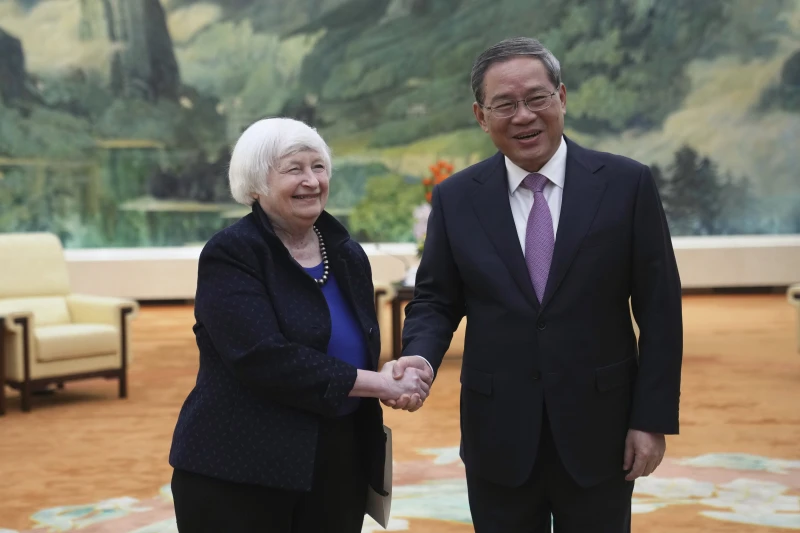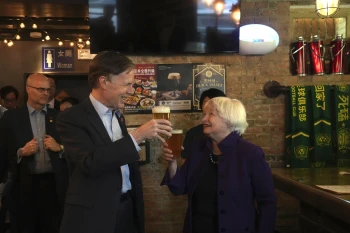The recent visit of U.S. Treasury Secretary Janet Yellen and her team to China has sparked discussions and negotiations on key issues between the two countries.
The primary focus of the talks was to address the unfair trade practices that have been a major concern for the Biden administration.
Yellen aimed to tackle the issue of Beijing’s economic model and trade practices, which have been accused of putting American companies and workers at a disadvantage.
One of the main grievances raised by the U.S. is the Chinese government’s subsidies and policy support for industries such as solar products, electric vehicles, and lithium-ion batteries.
This has led to overcapacity in these sectors, with Chinese companies dominating the global market. Yellen emphasized the risks of one nation holding a significant portion of production capacity in these industries, as it can have detrimental effects on other countries’ industries and the global economy as a whole.
During the meetings in Guangzhou, Yellen and Chinese Vice Premier He Lifeng discussed the need for more balanced economic growth and agreed to engage in “intensive exchanges” on the matter.
While it is clear that resolving these issues will take time and effort, both sides acknowledged the importance of addressing the issue and working towards a solution.
Another significant outcome of the talks was the agreement between the U.S. Treasury and the Chinese central bank to collaborate on combating money laundering in their respective financial systems.
The flow of precursor chemicals from China into the U.S. for the production of fentanyl, a deadly substance, has been a major concern for the U.S.
Exchanging information on money laundering related to fentanyl trafficking is seen as a crucial step in disrupting the flow of these chemicals into Mexico and the U.S.
Overall, the discussions between the U.S. and China have shed light on the complex issues surrounding trade practices and money laundering.
While progress has been made in addressing these issues, there is still much work to be done to ensure fair and equitable trade relations between the two countries.
The world will be watching closely as these discussions continue and as both nations work towards finding mutually beneficial solutions to these pressing challenges.
In a rapidly evolving global landscape where economic interdependence and technological advancements are reshaping the way nations interact, the recent collaborative efforts between the United States and China underscore the critical importance of international cooperation in addressing pressing challenges.
Treasury Secretary Janet Yellen’s announcement of a new cooperative endeavor aimed at countering threats through the utilization of all available tools, including international partnerships, signals a proactive approach towards enhancing financial stability and data security on a global scale.
The inception of the collaborative working group between the U.S. and China, within the framework of existing economic dialogues established last September, marks a significant step towards fostering mutual understanding and addressing shared concerns.
As both nations navigate complex geopolitical dynamics, the forthcoming exchange between the two countries holds promise for fostering dialogue and cooperation in key areas of economic significance.
One of the focal points of contention in recent discussions has been the popular social media app TikTok, owned by Chinese parent company ByteDance.
The debate surrounding TikTok’s operations has underscored the intersection of national security, data privacy, and economic interests.
While ByteDance has proposed data security measures such as “Project Texas” to allay concerns, U.S. lawmakers have advocated for stringent measures, including the possibility of banning the app or mandating divestment.
Secretary Yellen’s acknowledgment of the legitimate national security concerns related to sensitive personal data reflects a nuanced approach towards safeguarding critical information in an increasingly interconnected digital landscape.
Moreover, the agreement between the U.S. and China on enhancing financial stability through coordinated exercises in response to potential banking crises highlights the imperative of proactive risk management in the financial sector.
By simulating scenarios of large bank failures and devising coordinated strategies to mitigate systemic risks, both countries are demonstrating a shared commitment to preventing disruptions that could have far-reaching implications for the global financial system.
Secretary Yellen’s emphasis on operational resilience and the need for effective communication channels between financial regulators underscores the importance of proactive risk mitigation strategies in safeguarding against unforeseen financial crises.
Beyond the realms of diplomacy and economic policy, Secretary Yellen’s visit to China has also garnered attention for her culinary adventures, underscoring the cultural exchanges that often accompany high-level diplomatic engagements.

Yellen’s gastronomic escapades in Beijing, from sampling Sichuan cuisine at Lao Chuan Ban to enjoying a local craft beer at Jing-A Brewing Co., have not only showcased her culinary curiosity but also served as a bridge for cultural exchanges and informal interactions with Chinese officials and the public.
In conclusion, Secretary Yellen’s recent initiatives underscore the multifaceted nature of international cooperation, encompassing financial stability, data security, and cultural diplomacy.
By leveraging collaborative platforms and fostering dialogue on critical issues, the U.S. and China are setting a precedent for constructive engagement in an era defined by interconnectedness and shared challenges.
As global dynamics continue to evolve, proactive initiatives such as these are essential for building resilient partnerships and addressing complex issues that transcend national boundaries.

